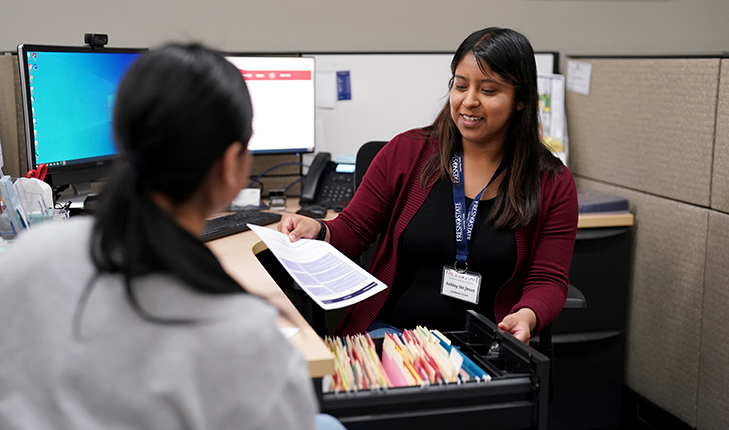Emily Matias came to Fresno State as a freshman majoring in social work, but by her sophomore year the insecurities of being a first-generation college student got the best of her. She stopped going to class and eventually dropped out.
“Many college students go through that — like you don’t know who you are and what you’re going to do with your life,” Matias said. “I stopped attending school without realizing there are consequences.”
She eventually enrolled at Fresno City College and earned an associate’s degree in communications and transferred back to Fresno State. Then, she received an email from Academic Success Coaching, one of three programs under the Learning Center at Fresno State, encouraging her to meet with a coach to help her navigate through college.
Matias, now a senior majoring in criminology (victimology option), made an appointment and hasn’t looked back since. Academic Success Coaching, formerly known as SupportNet, provides students with tailored support, and holistic coaching, through one-on-one meetings on topics like motivation, study skills, time management, test-taking strategies, campus resources and more to help them meet their full potential. The program also hosts workshops each semester allowing students who can’t meet one-on-one to drop in for valuable information.
During the 2021-22 academic year, Academic Success Coaching hosted nearly 3,200 academic coaching sessions, an increase of 71% compared to the previous year. The program served more than 1,200 students, an increase of 58% from the year before.
Students come to Academic Success Coaching one of two ways, said coordinator Mazie Moua. One, they are on academic probation. Or two, students are referred by faculty and staff. Faculty made 574 referrals last year, a 185% increase from the previous year.
Returning to campus after the COVID pandemic could be one reason for an uptick in student use of the program, Moua said. But the university also knows that students have life challenges — full-time jobs on top of school, some are caring for siblings, others don’t have a place to stay or deal with violence, and some have mental health problems and depression, she said.
Moua encourages students to seek help early in their college careers rather than later. Students who connect with an academic coach have a retention rate of 56% compared to 20% for students who did not use the support service. Students who took advantage of academic coaching also saw an increase in their GPA.
Additional services in Tutoring and Supplemental Instruction are also available at the Learning Center, a space on the bottom floor of the library that encourages students to grow intellectually as critical thinkers using effective strategies to improve content understanding and course grades.
“We’re a program where you can connect with a coach who can really go through your whole academic journey with you — providing the strategies that you need for your courses, to connect you to different resources that may be beneficial for you,” Moua said.
Moua and Matias meet about three to four times a semester. They talk about what Matias is working on and what she’s struggling with. Moua has given her tips on note taking and has shared information with her about other campus resources such as the Amendola Family Student Cupboard, which provides food and hygiene items for students.
“She’s caring, kind. She tells me about the resources out there,” Matias said. “I also use tutoring a lot. If it wasn’t for them and for Mazie encouraging me, I don’t know if I would have passed my [stats] class.”
Matias is expected to graduate in 2024. She hopes to pursue her master’s degree in marriage, family and child counseling.





